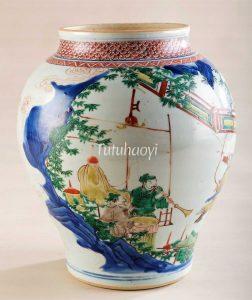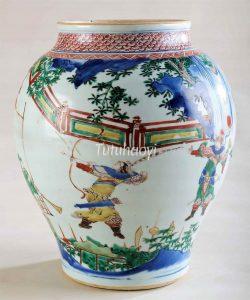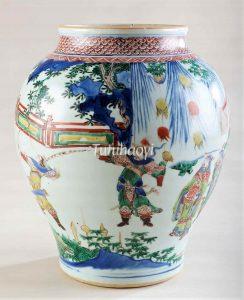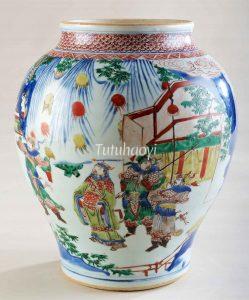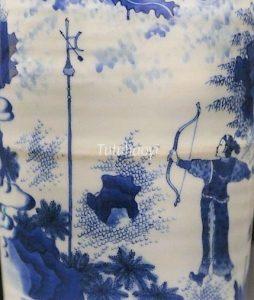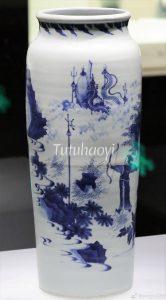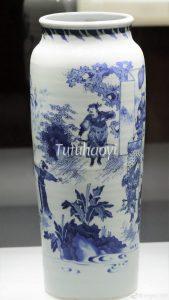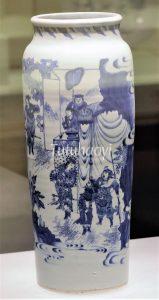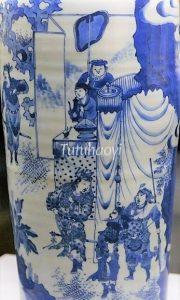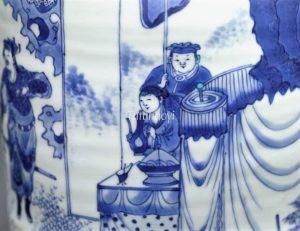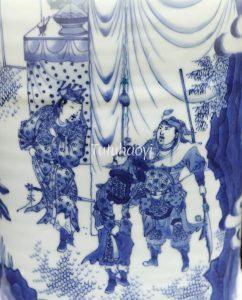Lv Bu’s Archery Stunt at the Camp Gate
吕布辕门射戟
© Tutuhaoyi.com owns the copyright of the description content for the images attached. Quoting all or part of the description content on this page is permitted ONLY IF ‘Tutuhaoyi.com’ is clearly acknowledged anywhere your quote is produced unless stated otherwise. (本页描述内容版权归Tutuhaoyi.com所有,转发或引用需注明 “Tutuhaoyi.com”, 侵权必究, 已注开源信息的条目除外。)
Lv Bu (吕布 Lü Bu, died 199 CE) is known as an almost unchallenged fighter in the period of the Three Kingdoms (三国, 220-280 CE) in Chinese history. The scene on the vase depicts a crucial moment when Lv Bu’s exceptional archery stunt astounded all the generals and soldiers present and then successfully quelled an imminent collision between two opposing camps.
This vignette is found in the Records of the Three Kingdoms, the most authoritative source text for that period, composed by Chen Shou (陈寿) in the third century. General Ji Ling (纪灵) led thirty thousand soldiers to launch an attack on Liu Bei (刘备), one of the heads of the Three Kingdoms, and Liu asked Lv Bu for help. Lv Bu decided to lend Liu a hand in spite of the objection from his lieutenants. Lv Bu explained to them that, if Liu Bei’s army collapsed, then his army would be Ji Ling’s next target. Lv Bu went to see Ji Ling with one thousand soldiers and held a drinking party inviting Liu Bei’s men as guests. After a round of clinking of glasses, Lv Bu said to Ji Ling, ‘Liu Bei is to me like a brother. I’ve come to rescue him. I don’t like conflicts but love to resolve disputes between people.’ Then, Lv Bu asked to have a ji (戟) halberd erect at the entrance of the camp enclosure and, raising his favourite bow up in the air, he inspected the crowd around him and announced, ‘Watch me shoot the short blade on the halberd. If my arrow hits it in one shot, both parties must call it a truce and leave. If it doesn’t, you may stay and fight.’ Sure enough, Lv Bu’s arrow hit where it was meant to hit and, flabbergasted, the crowd burst into a roar ‘General, you possess Heaven’s might!’ The next day saw revels participated by all three forces and a happy departure.
image identification and story scene description by Dr Yibin Ni
Fig 1-4: porcelain jar, Shunzhi period (1644-61), Qing dynasty, courtesy of the Sir Michael Butler Collection
Fig 5-11: blue-and-white rolwagen vase, Chongzhen period (1628-44), Ming dynasty, courtesy of the Liaoning Provincial Museum, photo: Weibo ID @sergio1968
